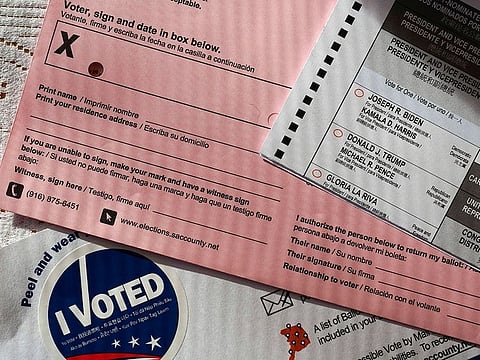Why the US presidential elections matter to the world
Biden victory is likely to bring back civility to US politics and usher national healing

The Middle East, like the rest of the world, is holding its breath as it awaits the outcome of the US presidential elections slated for 3 November. With only a few days left, President Donald Trump and Democratic nominee Joe Biden are hitting the campaign trail in so-called battleground states that are a must win in order to claim the White House. Also at stake, in this most consequential of elections in modern times, are the House of Representative and the Senate, which most polls predict that they will be controlled by the Democrats.
Until last Monday more than 60 million ballots have been cast in what pundits predict will be a historic election in terms of voter turnout since the early 1900s. If polls are to be believed Biden is on his way to win in a landslide. But with America’s controversial Electoral College system, which determines the winner rather than the result of the popular vote, anything can happen. Trump still has a narrow path towards winning a second term.
Why is this election consequential? Trump had stormed into the political stage while bashing his opponents by adopting unconventional populist, divisive and maverick political tactics. His historic win in 2016 had inspired right wing candidates around the world and Trumpism has become synonymous with populism as a mainstream political ideology whose effects can be seen in central and Eastern Europe, Brazil, Turkey and the Philippines. There is no doubt that Trump’s unique style of using incitement while displaying hubris and xenophobia have had a deep and disturbing effect on many democracies around the globe.
At no point in modern times has the United States been so divided along bi-partisan lines. Furthermore, Trump’s ambiguity on issues relating to race, religion, women and minorities has empowered fringe groups like white supremacists and black extremists; raising the spectre of violent clashes regardless of the outcome of the elections.
A Biden victory would bring back civility to US politics and usher a phase of national healing, it is believed. But the effects of the Trump presidency will linger for a long time; ultimately because of his latest success in appointing a third conservative Supreme Court judge, Amy Coney Barrett, a few days before the elections. This will definitely be his lasting legacy.
For the rest of the world a Biden victory will be viewed as a relief — an opportunity for a foreign policy reset — but not by all. For the Middle East, Trump was able to initiate a major geopolitical swing in the region. He managed to contain Iran by reimposing tough economic sanctions following his withdrawal from the nuclear deal of 2015. He helped set the stage for a new alliance between many Gulf States and Israel. In his bid to end America’s endless wars, Trump has negotiated directly with the Taliban hoping to pull back American troops from Afghanistan. He has reduced the number of troops in Iraq while putting pressure on the Iraqi government to curtail Iran’s influence over Iraqi politics.
How President Biden will revisit these conflicts remains to be seen. The Biden administration will likely be absorbed in its first year or more in fighting and containing the spread of COVID-19 in the United States; a major factor in weakening the chances of a second Trump term. Trump’s mismanagement of the pandemic — the US leads the world in daily infections and total fatalities — is now seen as his Achilles heel.
Of course there is still a chance that Trump may find a narrow path to victory. This may frustrate much of the world, but will certainly polarise the American society further. His bid to dismantle the last of Barack Obama’s legacies, the Affordable Care Act, will deny millions of Americans access to less costly health insurance. With a majority of Conservative judges at the Supreme Court many fear that Trump will push to roll back much of what women and minorities had achieved over the past few decades. It is questionable if Trump will be able to restore millions of jobs lost, contain the pandemic and help America’s unprivileged. Divisions within the US society are likely to deepen.
For the rest of the world a second Trump term will raise concerns about climate change, arms race, renewable energy, a new cold war with China, human rights, the future of the UN, Nato and others. Trump’s isolationist path will reflect on the current geopolitical balance creating a vacuum, that Russia may be eager to fill.
Osama Al Sharif is a journalist and political commentator based in Amman.
Sign up for the Daily Briefing
Get the latest news and updates straight to your inbox







